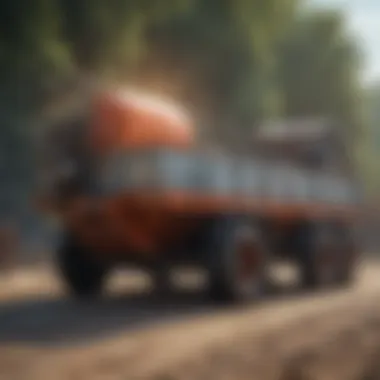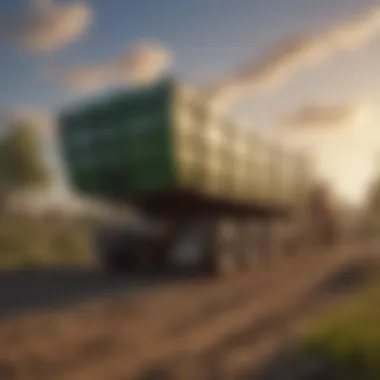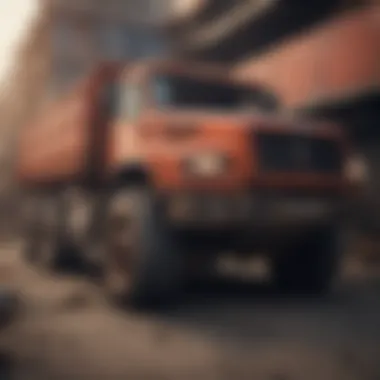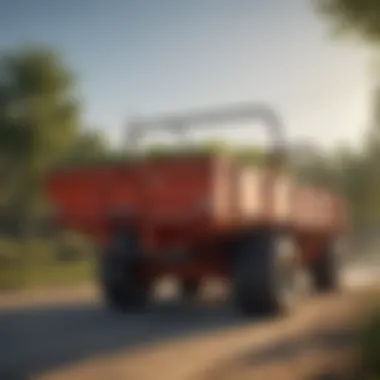Gondola Scrap Trailers: A Comprehensive Guide


Intro
Gondola scrap trailers have carved a niche in the agricultural sector, serving as essential tools for transporting various materials. Their design allows for efficient loading and unloading while maintaining durability in challenging farming environments. Understanding the intricacies of gondola scrap trailers can greatly benefit agricultural professionals, offering insights on not only their functionality but also their significance in contemporary farming practices.
Latest Trends in Agriculture
Overview of Current Trends
The agricultural landscape is shifting, with an increasing emphasis on sustainability and efficiency. Farmers are moving towards innovation that maximizes productivity while minimizing environmental impact. This transition aligns with the adoption of gondola scrap trailers, as they facilitate quicker transportation and better management of agricultural waste and by-products.
Impact of Technology on Farming Practices
Technology plays a pivotal role in this evolution. Advancements in trailer design, materials, and weight distribution systems have significantly improved the user experience. For instance, smart farming technologies now allow for real-time tracking of cargo loads, optimizing routes and reducing fuel consumption. Such innovations enhance the operational efficiency of gondola trailers in agricultural settings.
Sustainable Practices: Towards a Greener Future
Importance of Sustainability in Agriculture
As the effects of climate change become increasingly apparent, the need for sustainable practices in agriculture cannot be overstated. The utilization of gondola scrap trailers fits seamlessly into this paradigm. They enable farmers to manage scrap more effectively, minimizing waste and promoting recycling within agricultural operations. This aligns with broader sustainability goals that many farmers are now actively pursuing.
Methods for Sustainable Farming
There are several methods employed by farmers to enhance sustainability:
- Composting Organic Waste: Using gondola trailers to transport scrap material for composting helps in returning nutrients to the soil.
- Utilizing Renewable Energy Sources: Many farmers are investing in renewable energy to power equipment, thereby reducing reliance on fossil fuels.
- Implementing Crop Rotation: This technique is enhanced by the ease of transporting diverse crops with gondola trailers, tremendously lowering soil depletion risks.
Maintenance Practices For Gondola Scrap Trailers
Regular maintenance is crucial for ensuring the longevity and performance of gondola scrap trailers. Here are some key practices:
- Routine Inspections: Regularly check for damage or wear to the trailer body and axles.
- Lubrication of Moving Parts: Keeping mechanical components well-lubricated ensures smooth operation and minimizes cost related to wear and tear.
- Cleaning: Maintaining cleanliness prevents rust and prolongs the trailer's life.
Finale
Gondola scrap trailers play a vital role in modern agriculture by enhancing efficiency and sustainability. Understanding the trends, maintenance practices, and their broader implications can empower agricultural professionals to make informed decisions. With ongoing advancements, these trailers are likely to continue adapting to meet the needs of farmers in an evolving agricultural landscape.
Prologue to Gondola Scrap Trailers
Understanding gondola scrap trailers is vital in agriculture. These trailers serve various purposes, mainly in transporting agricultural byproducts and waste. Their design and functionality are crucial for farmers to manage the increasing demands and ensure efficiency on the field. Furthermore, awareness of maintenance practices and regulatory implications can significantly impact their operational longevity and effectiveness.
Definition and Overview
Gondola scrap trailers are specialized trailers designed primarily for hauling loose materials, primarily agricultural byproducts such as crop residues and waste. Characterized by their distinct box-like shape, these trailers feature open tops or sides that facilitate easy loading and unloading. They come in varying sizes and specifications, making them suitable for diverse agricultural applications.
Key features typically include:
- A robust and sturdy frame to support heavy loads.
- Durable flooring to withstand the weight of scrap materials.
- Options for additional features such as tarps or side walls to secure the load during transport.
Efficiency in transporting materials is a top benefit of using gondola scrap trailers. Their structural design allows farmers to maximize payload while minimizing operational costs.
Historical Context
The evolution of gondola scrap trailers parallels advancements in modern agriculture. Historically, farmers relied heavily on traditional methods for waste management, which often involved labor-intensive processes. As agricultural operations expanded, the need for more efficient transport solutions grew.
The first gondola designs appeared in the mid-20th century. As mechanization progressed, these trailers began to incorporate more advanced materials and designs. Initially, made from wood, they transitioned to steel and aluminum, enhancing durability and load capacity. This evolution reflects broader trends in agriculture where efficiency drives innovations.
In recent years, a renewed emphasis on sustainability and waste reduction in agriculture has brought gondola scrap trailers back into focus. They play a role not just in transport, but also in aligning with best practices for waste management on farms. This historical perspective helps to understand their current importance and application in agricultural practices.
Design Features of Gondola Scrap Trailers
The design features of gondola scrap trailers are critical in determining their performance and suitability for various agricultural tasks. These trailers must meet the specific demands of transporting agricultural byproducts, waste, and scrap materials. Understanding these features allows farmers and agricultural professionals to make informed decisions about which trailers best fit their operations.


Construction Materials Used
The construction materials used in gondola scrap trailers play a significant role in their durability and effectiveness. Common materials include steel, aluminum, and high-density polyethylene.
- Steel: Often favored for its strength and longevity, steel provides excellent load-bearing capabilities. However, it is prone to rust if not properly maintained. Farmers should consider galvanized steel options for increased resistance to corrosion.
- Aluminum: This material is lighter and resistant to rust. Aluminum trailers are easier to maneuver but may not have the same load capacity as steel trailers. Farmers should evaluate their specific needs before choosing aluminum.
- High-Density Polyethylene: Used in certain components, this polymer offers excellent resistance to impact and chemicals. It is lightweight and can help reduce overall trailer weight.
Using the right materials can enhance the longevity and functionality of these trailers, making them adaptable for varying agricultural tasks.
Structural Integrity and Load Capacity
Structural integrity and load capacity are paramount in selecting gondola scrap trailers. These factors ensure the trailer can safely handle the weight of the materials being transported.
- Load Capacity: This is defined by the materials used and the design of the trailer. Farmers need to determine the maximum load their trailers can carry, which can affect efficiency and safety in farm operations. It’s typical for gondola trailers to have load capacities ranging from 5,000 to 10,000 pounds.
- Structural Integrity: Design elements such as cross braces and support beams contribute to the overall strength. A well-designed trailer offers stability, preventing deformation under heavy loads, which can occur during transport on uneven terrain.
Ensuring the trailer’s strength helps in minimizing repairs and optimizing performance, which ultimately translates to lower operational costs for farmers.
Customizations and Variants
Gondola scrap trailers can also be customized to meet specific agricultural needs. This flexibility is one of their notable features.
- Custom Size Options: Farmers can request trailers in varying lengths and widths, based on the requirements of their equipment and the type of material transported.
- Accessory Installation: Custom features like removable sidewalls, adjustable hitches, and specialized ramps can enhance usability.
- Color and Branding: Many manufacturers allow customization of colors as well, enabling farms to use branding on their equipment.
Greater customization options allow farmers to tailor trailers to their unique workflows, maximizing efficiency in transporting agricultural scrap and byproducts.
Key Note: Proper design features in gondola scrap trailers can greatly enhance their functional life and usability in an agricultural setting, making informed choices vital.
Types of Gondola Scrap Trailers
Understanding the types of gondola scrap trailers is essential for agricultural professionals and enthusiasts. Each type has unique attributes that can significantly affect its performance and suitability for specific agricultural tasks. Selecting the right trailer type can impact overall efficiency, cost, and effectiveness of operations.
Single Axle vs. Dual Axle Trailers
Single axle trailers are often simpler and lighter. They are typically easier to maneuver, making them ideal for smaller farms or narrow fields. However, their load capacity is comparatively lower, which can limit the volume of materials transported in one trip. This makes them suitable for lighter loads such as small-scale produce or garden waste.
In contrast, dual axle trailers provide enhanced stability and load-bearing capacity. They are designed for heavier loads and often used in larger agricultural operations. Dual axles distribute the weight more evenly, reducing wear and tear on both the trailer and the towing vehicle. This makes them more suitable for transporting larger quantities of material like grain or bulk hay.
Heavy-Duty Options
Heavy-duty gondola scrap trailers are built for serious agricultural work. They feature reinforced structures and are capable of handling significant loads, often exceeding standard trailer capacities. These trailers are designed for rugged terrain and demanding conditions, making them particularly beneficial for farms engaged in large-scale operations or requiring high durability.
Farmers should consider their specific needs before opting for a heavy-duty model. The investment can be substantial, but the return is often justified by the increase in productivity. High-quality heavy-duty options can contribute to improved efficiency in transporting large quantities of materials, thus saving time and reducing wear on other equipment.
Specialized Agricultural Trailers
Specialized agricultural trailers focus on specific farming needs. These can include trailers designed for specific crops or types of waste. For instance, some trailers are engineered for the efficient transport of specific commodities like potatoes or corn, featuring tailored designs that maximize load security and minimize spoiling.
Moreover, specialized trailers might include features such as hydraulic systems for quick unloading, adjustable sides to accommodate varying volume loads, or configurations suitable for specific farming practices. Farmers benefit from these custom solutions as they enhance operational efficiency and ensure the best care for agricultural products during transport.
"Choosing the right gondola scrap trailer can make all the difference in farm efficiency and productivity. Each type serves distinct purposes that align with specific needs of agricultural operations."
Functionality in the Agricultural Sector
Gondola scrap trailers play a crucial role in the agricultural sector, addressing numerous operational needs. They serve as efficient transport solutions for agricultural byproducts, aid in waste management, and integrate seamlessly with farming equipment. By understanding these functionalities, farmers and agricultural professionals can enhance their farming practices and improve overall efficiency.
Transporting Agricultural Byproducts
The transportation of agricultural byproducts is a significant function of gondola scrap trailers. These trailers are designed to handle a wide array of materials, which include crop residues, livestock manure, and other organic waste. The versatility of gondola trailers allows for optimized loading and unloading processes.
Benefits include:
- Increased Payload Capacity: Gondola trailers generally have a larger carrying ability than other types of trailers, making them ideal for moving substantial amounts of byproducts at once.
- Ease of Loading: Their open-top design facilitates easy access for loading, whether using a front-end loader or other machinery.
- Timely Transport: Quick transport of byproducts to processing sites or for composting has implications for reducing waste and promoting sustainability.
Role in Waste Management


Effective waste management is essential in agriculture to minimize environmental impact and promote ecological balance. Gondola scrap trailers contribute significantly to waste management strategies by collecting and transporting organic waste for proper disposal or recycling.
Key factors include:
- Reduction of Pathogen Spread: Timely removal of organic waste with gondola trailers helps avoid disease spread among livestock and crops.
- Facilitates Composting: By transporting waste materials efficiently, these trailers enable better composting practices that return nutrients to the soil.
- Compliance with Regulations: Proper waste management using gondola trailers helps farmers adhere to environmental regulations, enhancing their operational credibility.
Integration with Farming Equipment
Gondola scrap trailers are designed to be compatible with various farming equipment, which ensures a smooth workflow on the farm. Their functionality extends to compatibility with tractors and other agricultural machines, allowing for seamless integration in daily operations.
Considerations include:
- Operational Efficiency: The use of gondola trailers in conjunction with tractors enhances operational efficiency, allowing farmers to complete tasks quicker and reduce equipment wear.
- Versatility: Many gondola trailers can be customized to interface with different machines, which provides flexibility depending on the specific needs of a farm.
- Increased Automation Potential: With advances in technology, integrating gondola trailers with automated systems can lead to further improved efficiency and reduced labor costs.
"The use of gondola trailers not only transforms agricultural operations but also enhances sustainability practices across farming operations."
In summary, gondola scrap trailers are indispensable within the agricultural sector. Their capabilities in transporting byproducts, waste management, and equipment integration present numerous advantages that can significantly improve farming practices. Understanding these functionalities enables farmers to make informed decisions that can lead to enhanced productivity and sustainability in agriculture.
Maintenance and Care of Gondola Scrap Trailers
Proper maintenance and care of gondola scrap trailers is crucial for their longevity and performance. These trailers play an essential role in agricultural operations, facilitating the effective transportation of scrap materials and byproducts. Regular upkeep not only enhances the durability of the trailers but also ensures safety during their use. Neglecting maintenance can lead to costly repairs and unsafe conditions, affecting overall productivity.
Routine Inspection Guidelines
Routine inspections of gondola scrap trailers help identify potential issues before they escalate into major problems. Here are some key elements to include in any regular inspection:
- Tires and Wheels: Check for correct air pressure, tread wear, and any signs of damage. Proper tire maintenance ensures optimal traction and safety.
- Brakes: Inspect the braking system for effectiveness. Look for wear on brake pads and ensure that brake fluid levels are adequate.
- Frame and Structure: Examine the overall integrity of the trailer’s frame. Look for rust, corrosion, or signs of stress, especially at weld points.
- Hitch and Coupling: Ensure that the coupling mechanism is functioning correctly and check for rust or wear that could compromise safety.
- Lighting: Test all lights, including brake lights and turn signals, to ensure they are operational. This keeps you compliant with regulations and improves visibility.
Conducting these inspections regularly, ideally before and after each use, keeps the gondola trailers in top condition.
Repair Techniques and Best Practices
When repairs are needed, employing the correct techniques is vital to maintain the integrity and performance of gondola scrap trailers. Here are some best practices:
- Welding and Fabrication: For structural repairs, utilize high-quality welding techniques. Ensure that any fabrication matches the original specifications to maintain strength.
- Electrical Systems: For electrical issues, use the manufacturer’s guidelines for troubleshooting. Ensure you safely disconnect power sources before performing repairs.
- Mechanical Components: Replace worn-out mechanical parts with OEM (Original Equipment Manufacturer) components to ensure compatibility and performance.
- Corrosion Prevention: Treat any exposed metal surfaces with anti-corrosion paint or coatings to prevent further deterioration.
- Documentation: Keep a log of all inspections and repairs. This not only tracks the trailer’s history but can also be essential for future maintenance decisions.
By adhering to these guidelines, you can maximize the lifespan of your gondola scrap trailers and ensure they are always ready to meet agricultural demands.
Economic Considerations
Understanding the economic considerations surrounding gondola scrap trailers in agriculture is pivotal for farmers and agricultural business professionals. Decisions made regarding the use, purchase, and maintenance of these trailers can significantly influence operational efficiency and overall profitability. By delving into cost analysis, budgeting strategies, and return on investment factors, one can gauge the financial implications associated with these trailers.
Cost Analysis and Budgeting
Cost analysis involves a comprehensive examination of both direct and indirect expenses related to gondola scrap trailers. The primary expenses include the initial acquisition cost, maintenance expenses, and operational costs such as fuel and labor. Additionally, the depreciation of assets over time must be considered in any budget. For any agricultural enterprise, it is essential to establish a realistic budget that accommodates these variables.
When budgeting for gondola scrap trailers, farmers should consider the following:
- Purchase price: The upfront cost varies depending on size, capacity, and custom features of the trailer.
- Maintenance costs: Regular maintenance efforts, such as inspections and repairs, should be factored in.
- Operational costs: These could include fuel consumption, insurance, and labor associated with using the trailers.
- Financing options: Understanding the financial implications of loans or leasing can help in managing cash flows.
Creating an accurate budget fosters better decision making, ensuring that farmers can sustain their operations without overextending financially.
Return on Investment Factors
Investing in gondola scrap trailers is not just about the initial purchase. It is about understanding how these assets contribute to long-term profitability and efficiency. Several factors play into the return on investment (ROI) when acquiring gondola trailers. These include:
- Increased efficiency: If a gondola scrap trailer improves the speed and efficiency of transporting scrap materials, the business may save time and labor costs.
- Versatility: Trailers that can handle various types of agricultural products may increase usage and therefore enhance ROI.
- Durability: Higher-quality trailers typically incur fewer repairs and replacements, leading to long-term savings.
- Market demand: An appropriate cost analysis ensures that the ability to meet market demands and avoid downtime is factored into decisions.
Farmers must evaluate these factors holistically to truly appreciate the financial benefits linked to gondola scrap trailers. Overall, assessing both costs and potential returns allows for informed choices that can propel agricultural practices forward.
Regulatory Framework Affecting Gondola Trailers


Understanding the regulatory framework surrounding gondola scrap trailers is crucial for agricultural businesses. These regulations influence how trailers are designed, manufactured, and utilized in the field. Compliance with safety standards ensures that these trailers can transport significant amounts of agricultural materials without compromising the safety of operators or other road users. Additionally, regulatory considerations involving environmental impacts are increasingly essential as sustainable practices become a priority in agriculture.
Safety Standards and Compliance
Safety standards are designed to protect individuals who operate gondola scrap trailers and others who share the road. These standards vary by location but generally include requirements on trailer brakes, lights, and structural integrity. Manufacturers must ensure their products meet these regulations to avoid legal penalties. Operators, too, must be educated about completing safety checks before use and adhering to weight restrictions.
Some key safety compliance elements include:
- Brake systems: Must function properly and provide sufficient stopping power.
- Lighting & visibility: Trailers should be equipped with adequate lighting for visibility, especially in low-light conditions.
- Structural tests: Regular assessments to validate the trailer's integrity under load.
- Operator training: Ensures that those who handle these trailers understand the operational risks and best practices.
Compliance with safety standards is not just a legal obligation; it protects lives and promotes efficiency in agricultural operations.
Environmental Regulations
Environmental regulations are becoming more relevant in the context of gondola scrap trailers, particularly as agricultural practices face increasing scrutiny regarding their ecological impact. Operators must be aware of how their equipment interacts with the environment, especially concerning littering and emissions.
Key aspects of environmental regulations include:
- Waste management: Regulations often dictate how agricultural waste should be disposed of or recycled, which impacts how gondola trailers manage byproducts.
- Emissions standards: New laws may affect the types of vehicles allowed to tow trailers, particularly if they are not compliant with standards aimed at reducing greenhouse gases.
- Impact assessments: Some regions require environmental impact assessments for specific agricultural practices, including the use of trailers during particular seasons to limit land degradation.
Future Trends in Gondola Scrap Trailers
Looking ahead, the landscape of agriculture is changing rapidly. The role of gondola scrap trailers is becoming more significant due to various factors. These changes are influenced by advances in technology and a growing emphasis on sustainability within the industry. Understanding these future trends helps professionals make informed decisions regarding the operation and acquisition of these trailers.
Technological Advancements
The integration of technology in agriculture increases efficiency and effectiveness. Gondola scrap trailers are no exception. Innovations such as automated loading systems and telematics are beginning to emerge. Telemetry systems allow farmers to monitor trailer performance in real-time. This development leads to better management of resources and improved logistics.
Moreover, advancements in materials technology are making trailers lighter without compromising their strength. This changing dynamic can enhance fuel efficiency during transport. Smart connectivity is another frontier. By using IoT (Internet of Things) systems, farmers can track their trailers' locations, which reduces the chances of theft.
In summary, technology is reshaping gondola scrap trailers to meet modern agricultural needs. Farmers who adapt to these technologies stand to gain competitive advantages.
Sustainability Initiatives
The agricultural industry is increasingly focused on sustainability. Gondola scrap trailers contribute to this movement by facilitating the transport of organic waste and byproducts efficiently. Recognizing the importance of waste management, gondola trailers are now being designed with eco-friendliness in mind.
New models incorporate features such as:
- Recyclable materials: Utilizing materials that can be recycled contributes to a circular economy.
- Energy-efficient designs: Features that reduce fuel consumption play a critical role in lowering carbon emissions.
- Promoting local recycling programs: These initiatives often depend on effective transportation methods, which gondola trailers can provide.
Additionally, agricultural practices that emphasize regenerative methods are becoming popular. The role of gondola scrap trailers in recovering organic material and returning it to the soil as compost demonstrates their value.
"Sustainability in agriculture is not just a trend; it's a necessity that shapes future practices and technologies."
By prioritizing sustainability in their design and usage, gondola scrap trailers not only support farmers in achieving environmental goals but also improve overall farm productivity.
Closure
This thorough examination of gondola scrap trailers highlights their vital role in modern agricultural practices. As farms evolve and the demand for efficiency increases, the function of these trailers becomes more pronounced. They are not merely tools but integral components that facilitate the movement and management of agricultural byproducts, thus enhancing operational productivity.
Summary of Key Insights
In summary, several key insights emerge from the analysis of gondola scrap trailers:
- Versatile Applications: These trailers serve multiple purposes, including transporting agricultural waste, recycling materials, and aiding in waste management.
- Design and Durability: The structural integrity and choice of materials influence their longevity and load capacity, making them reliable for heavy-duty tasks.
- Economic Benefits: Understanding the cost-benefit dynamics and return on investment is critical for farmers considering these trailers as part of their equipment.
- Regulatory Awareness: Compliance with safety and environmental regulations is essential for the optimal and responsible use of gondola trailers.
Each of these elements plays a significant part in ensuring that agricultural enterprises can maximize efficiency while remaining compliant and economically viable.
Implications for Future Agricultural Practices
The implications of gondola scrap trailers extend into the future of agricultural operations. As technology advances, we may see more innovative designs that improve efficiency and sustainability. For instance, the integration of smart technology could allow for real-time monitoring of payload and route optimization, ultimately enhancing productivity.
Farmers must also consider sustainability in their operations. Gondola trailers that promote recycling and minimal waste outputs can align with environmental stewardship goals, making them even more valuable.
In closing, gondola scrap trailers are multifaceted assets that can define the future of agricultural logistics. Farmers and stakeholders who embrace these tools, with awareness of the evolving landscape, are likely to find themselves at the forefront of agricultural innovation.
"Understanding the nuances of gondola scrap trailers leads to more informed decisions that can transform agricultural practices."
For further insights into agriculture and related topics, you can explore more resources on sites like Wikipedia and Britannica.







